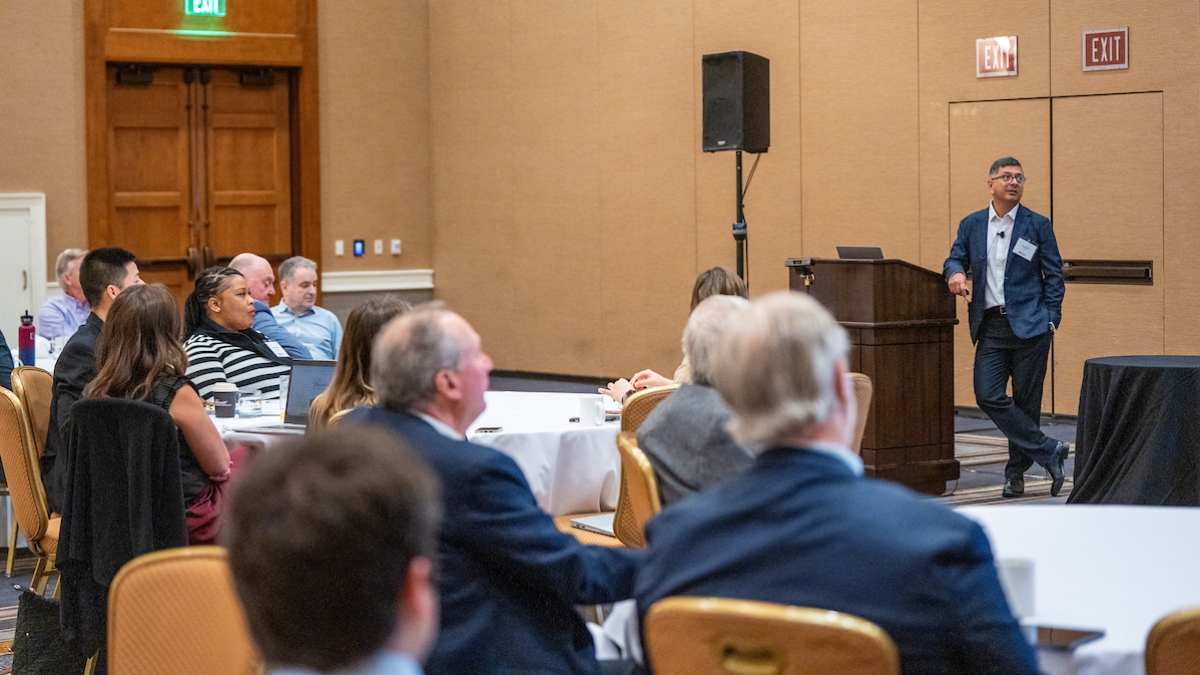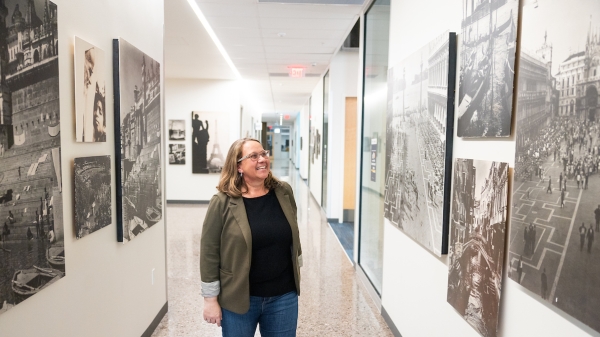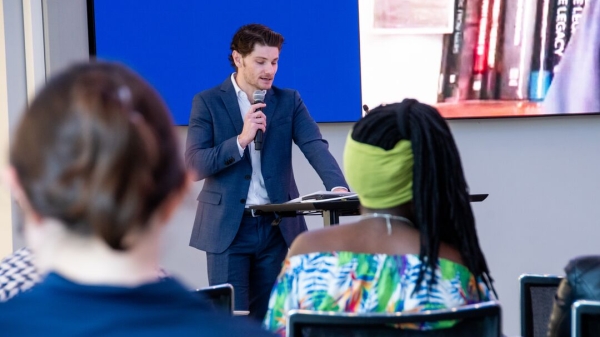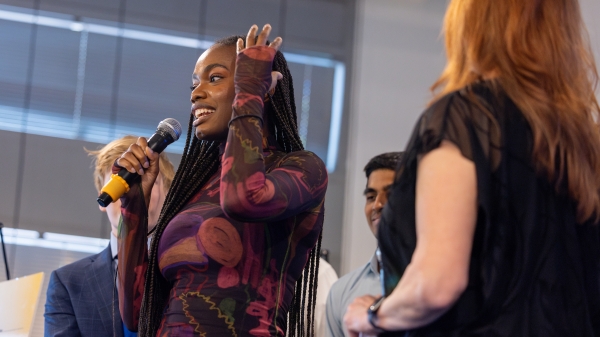Inaugural ASU conference explores sustainable investing
W. P. Carey center hosts global experts to discuss the science of investing in climate, biodiversity and governance

Sunil Wahal, professor and director of the Center for Responsible Investing, talks to attendees at the center's inaugural conference. Photo courtesy the W. P. Carey School of Business/ASU
According to Ivo Welch, "When we narrow our focus to (climate change) issues that are both rational and have plausible courses of action, there is remarkably little we disagree about.”
Welch, professor of finance at UCLA Anderson School of Management and author of “Global Climate Change: The Pragmatist’s Guide to Moving the Needle,” spoke these words to a group of academics and practitioners who gathered recently at Arizona State University for the W. P. Carey School of Business Center for Responsible Investing (CRI) inaugural conference: “The Science Behind Responsible Investing: Knowns and Unknowns in Climate, Biodiversity, and Governance.”
Still, the conference saw plenty of healthy disagreement and discussion — and not just about climate.
Sunil Wahal, Furst Endowed Professor of Finance and director of the CRI, kicked off the conference, saying, “Our goal for this inaugural conference was to bring together the generators of the science behind responsible investing and practitioners who both create and consume responsible investment strategies.”
The room was full of both, representing decades of research in a variety of fields and billions of dollars in investment capital. With a clear understanding of the goals, the remainder of the conference focused on the research and expertise of global experts, including academics and practitioners.
Andrew Karolyi, dean and professor of finance at Cornell University, and Rebecca Shaw, chief scientist at the World Wildlife Fund, discussed a new frontier in investing — biodiversity finance — that looks at ecosystem services provided by nature. Ecosystem services include vital functions, such as water provision and purification, pollination and flood control.
“In a way, we can look at ecosystem services as a kind of dividend,” Karolyi explained. “And just like typical investment dividends, they can also go negative.”
Shaw backed this up, citing the 2020 World Economic Forum’s Nature Economy Report, which estimated $44 trillion in value creation is moderately or highly dependent on nature and its services.
“When the World Economic Forum is looking at severe global concerns for the economy, environmental concerns, including loss of biodiversity, make up five of the top 10,” Shaw said.
Among the experts who shared their expertise at the conference were:
- ASU finance expert Hank Bessembinder, Francis J. and Mary B. Labriola Chair in Competitive Business, who discussed a new way of measuring sustainable investing for long-term investors — for example, those managing an endowment.
- Seth Pruitt, associate professor of finance, who presented new research explaining that the wealth of information currently available to environment, social and governance (ESG) investors means it is possible to improve a portfolio’s ESG score without significantly impacting average returns.
- Jeff Coles, professor of finance at the University of Utah, who focused on the “governance” aspect of ESG investing, describing the conclusions that investors can and cannot draw about selecting investments based on different governance measures.
From research to practice
In addition to the researchers in the room, the conference brought together practitioners both as presenters and in the audience. Robert Litterman, founding partner of Kepos Capital and a board member of the Julie Ann Wrigley Global Institute of Sustainability and Innovation, discussed the path-breaking potential of carbon-linked bonds.
Eduardo Repetto, chief investment officer at Avantis Investments, discussed the many approaches available for sustainable investing.
“ESG is just one part of an active portfolio management strategy,” Repetto said. “To have successful ESG investments, you depend on diversification and the overall universe of companies. So we work with clients to choose investments and risk that fit their needs.”
Bringing together both academics and those actively working in finance or financial services is vital to the CRI’s goals.
“The work we do at the CRI stems from a belief that investments can have indirect costs and benefits that may not be reflected in an asset’s price and that these ‘externalities’ can have societal effects,” Wahal said. “From that belief, we encourage and enable collaboration between academic researchers and practitioners.”
More Business and entrepreneurship

Thunderbird archives: These walls do talk
Editor’s note: This is part of a monthly series spotlighting special collections from ASU Library’s archives throughout 2024. At most universities, if you want to learn about their history, you must…

California roots, global impact: Thunderbird at ASU grad's journey in global management
Editor’s note: This story is part of a series of profiles of notable spring 2024 graduates. Lake Forest, California, native Kyle Kay was attracted to Thunderbird School of Global Management at…

ASU student entrepreneurs win cash investments for ventures at Demo Day
Several Arizona State University student entrepreneurs who won big cash investments for their ventures on Saturday expressed gratitude not only for the money but also the support they found in…